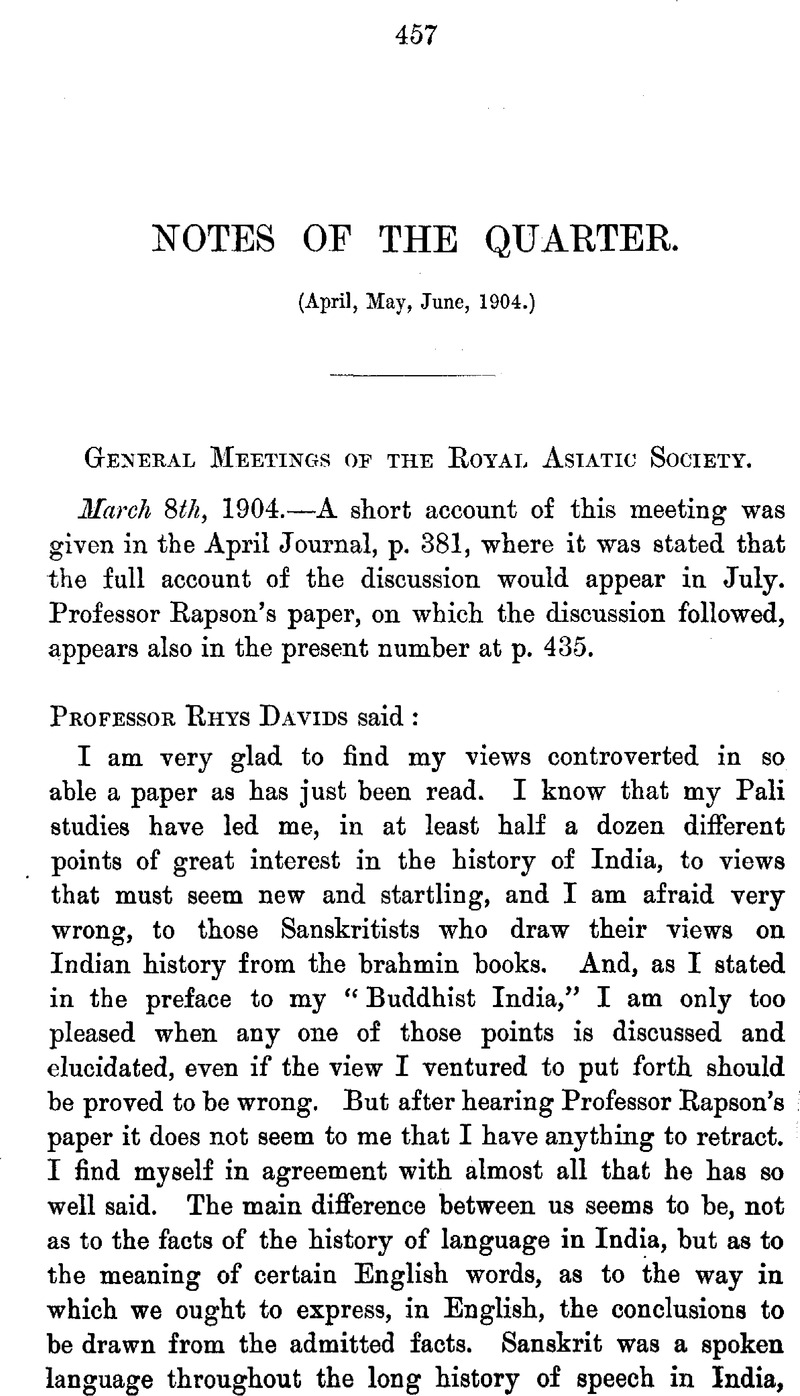No CrossRef data available.
Article contents
General Meetings of the Royal Asiatic Society
Published online by Cambridge University Press: 15 March 2011
Abstract

- Type
- Notes of the Quarter
- Information
- Copyright
- Copyright © The Royal Asiatic Society 1904
References
page 461 note 1 I use, however, c, ṣ, and ṃ instead of ch, sh, and ṁ.
page 463 note 1 See his review of Professor Rhys Davids' work in the Church Quarterly Review for July.
page 464 note 1 Numbers given by M. Senart (p. 407), which, however, might be modified by the adoption of Bühler's texts as a basis.
page 464 note 2 Or more probably vice versa (ppiya from ppriya after a vowel), in view of the doctrines of the Prātiśākhyas (cf. Whitney, “ Taittirīya-Prātiśākhya,” c. xiv, and reft, sub xiv, i).
page 466 note 1 Cf. Satapatha B., xi, 5. 7. 1. The later sense of this word janapakti, ‘ popular flattery ’ (Harṣacarita, Bomb, ed., p. 44, 1. 6 ; Jātakamālā, x, v. 35), merely illustrates the dangerous possibilities of popular teaching.
page 466 note 2 See Professor Eggeling's translation, pt. v, pp. 360–71.
page 469 note 1 Cf. Mbh. I, lvii, 40, śabdasaṃskāra (= yathāsthānakaraṇaprayatnam, uccāraṇam, Comm.).
page 470 note 1 Cf. Wackernagel, Altindische Grammatik, p. xxxii: “ In der folgenden Litteraturschicht, den Āraṇyakas und Upanishads einerseits, und den Sūtras andrerseits, ist im Ganzen der Punkt der Sprachentwicklung erreicht, der durch die klassische Grammatik dargestellt wird.”
page 478 note 1 It was objected at the meeting that these edicts are in Asōka's Māgadhī dialect. True. But they were meant to be understood, and if the local vernacular did possess these conjuncts, it is inconceivable that they should have been omitted.
page 478 note 2 The wording of Hēma-candra's sūtra is indeed that the retention of the r is the rule, and that it is its omission which is optional. There are numbers of Apabhraṁśa words in Hēma-candra with these conjunct r's. Some r's, in fact, are inserted without excuse of origin (iv, 399). Reference can be made to Professor Pischel's index. Compare also the Greek words mentioned later on.
page 478 note 3 I must withdraw this claim to originality. I see that I have been anticipated by Professor Pischel on p. 28 of his Prakrit Grammar.
page 479 note 1 I employ the word here in Dr. Leitner's sense, as the language of the country between La![]() mān and Gilgit. It will be noticed that I treat Paiśācī and Cūlikāpaiśācikā as but varieties of one and the same language.
mān and Gilgit. It will be noticed that I treat Paiśācī and Cūlikāpaiśācikā as but varieties of one and the same language.
page 479 note 2 Hēma-candra, iv, 314. Snāta becomes sināta, and kaṣṭa becomes kasaṭa.
page 479 note 3 Compare Dard krom for karmma.
page 479 note 4 Especially the commentaries on Pāṇini, 1, 3, 1, and 6, 3, 109.
page 479 note 5 See vol. i, p. 259,11. 5–14, and vol. iii, pp. 173–174, of Kielhorn's edition.
page 481 note 1 Alexander met Sandrokottus in the Western Panjab, the Piśāca country. Note how the g has been changed to k.




